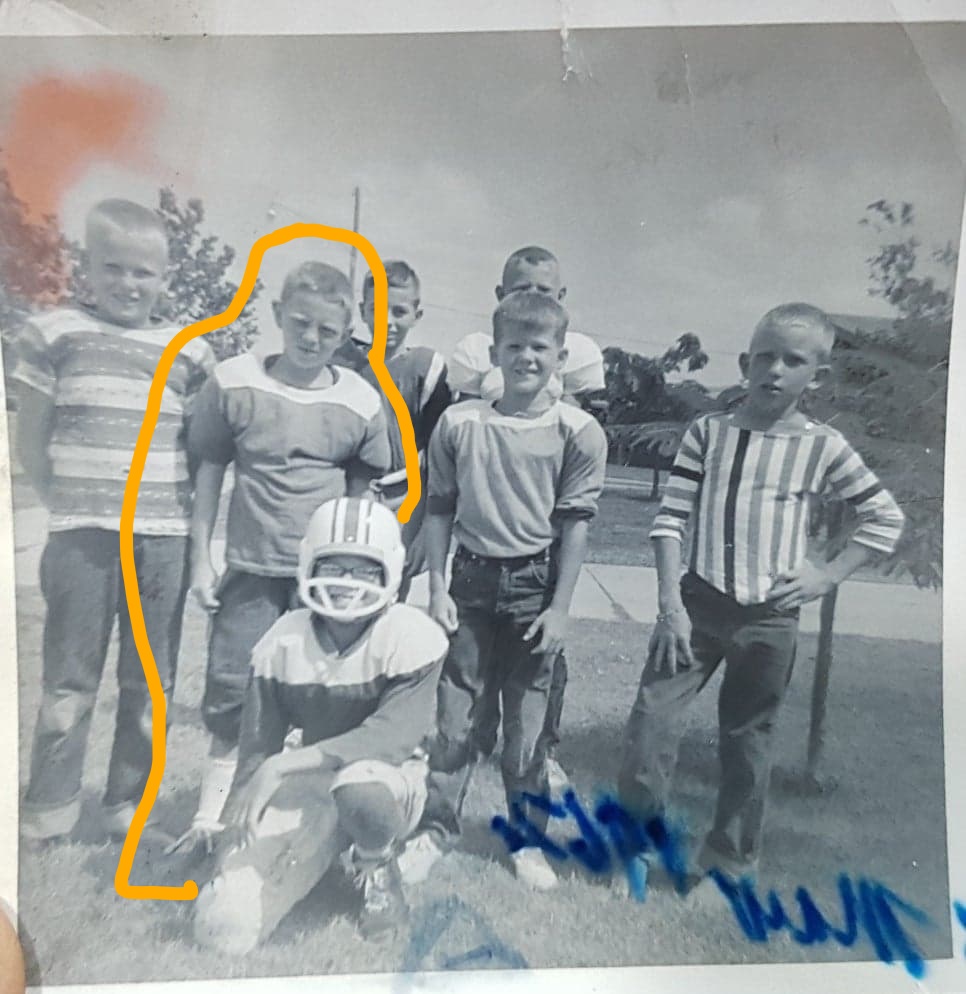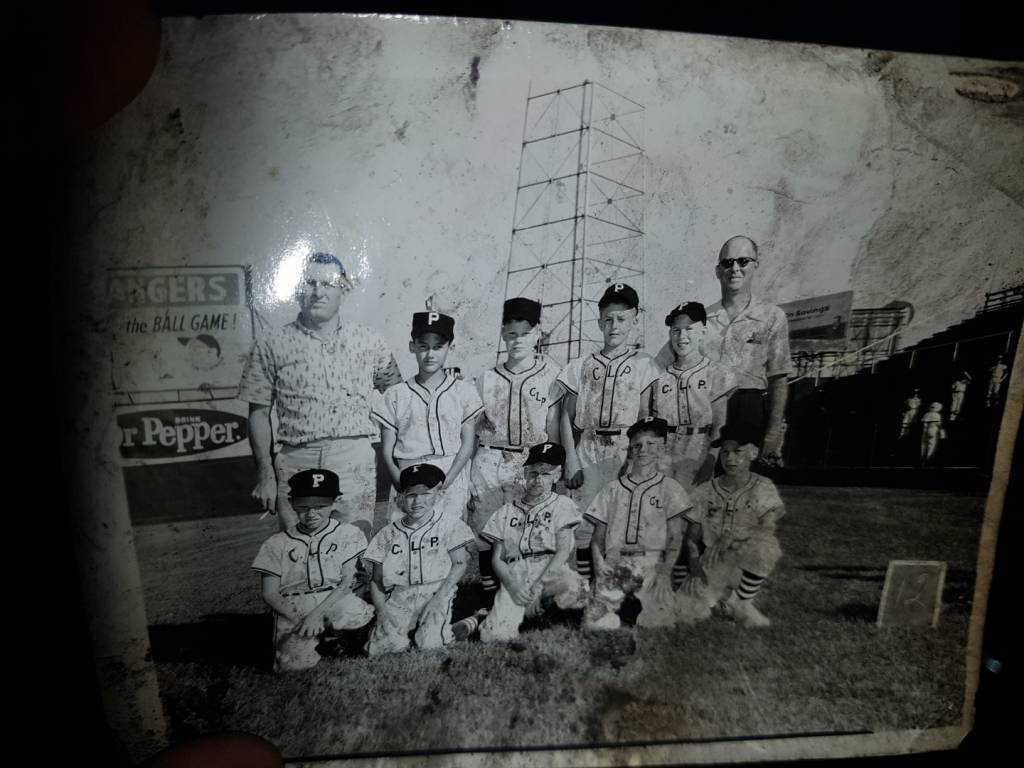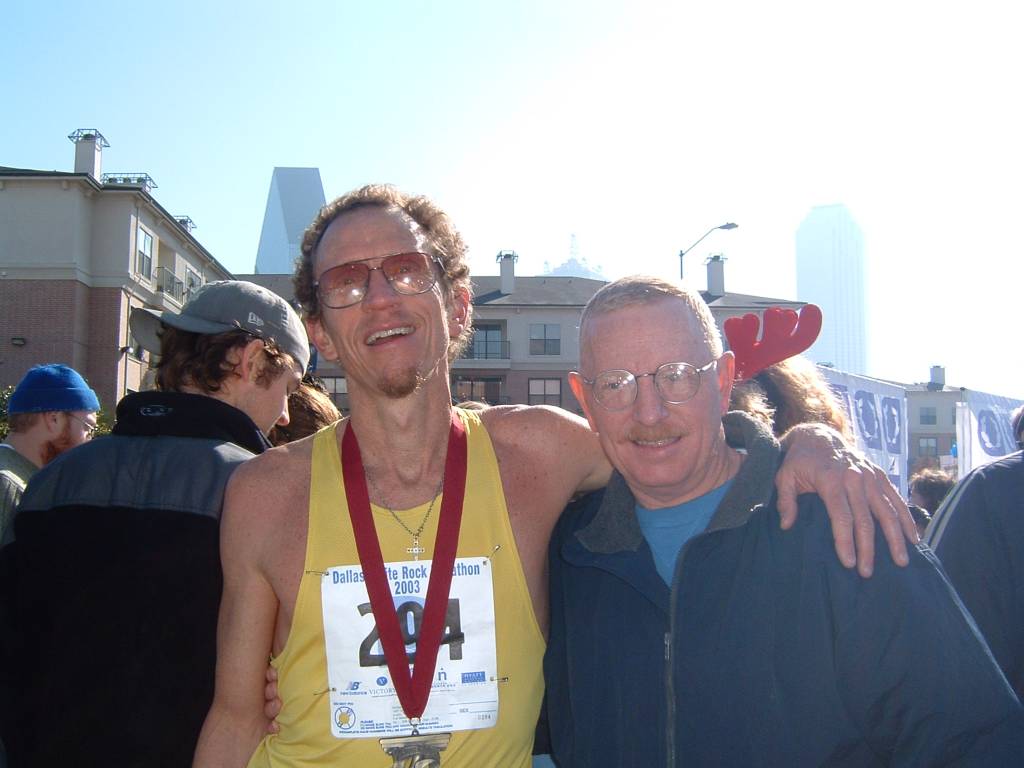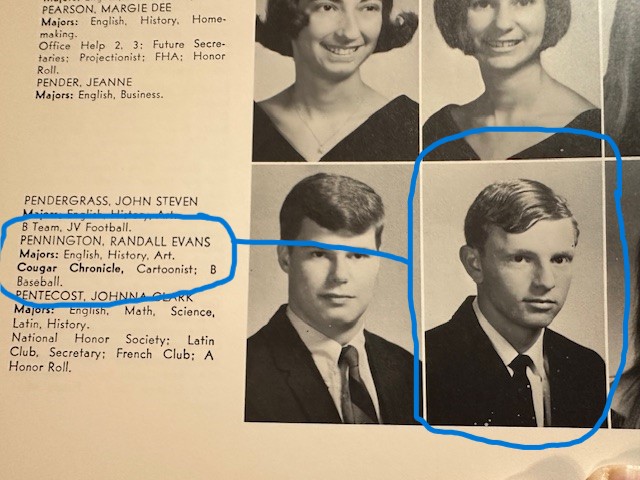My older brother, Randall Evans Pennington, died of a heart attack in late April. It is reflective of our broken and dysfunctional family that I was not informed until three months later. I will withhold further comment on that, preferring to reminisce about his 74 years.
Randy was delivered at Baylor Hospital in Dallas on October 16, 1950. We lived in the same house (often in the same room) in Oak Cliff, at 9880 Marlin Drive and at 9853 Champa Drive. As for educational institutions, we overlapped at Kiest and Hexter Elementary Schools and Bryan Adams High School—but not, however, at Hill Junior High School. He was there during the 1964-65 and 1965-66 school years, and I followed him directly.
I guess you could say we were “to the sporting life born.” Randy and I—along with the other neighborhood boys in those baby-boomer days—played baseball, football and basketball constantly. At other times, we made up games or forms of competition like impromptu track meets. If it involved running, jumping and just playing, we did it. Bumps, bruises and skinned knees and elbows were far from unusual. Our father, who was himself fairly sports oriented, may deserve some degree of credit for this. I am eternally grateful that physical activity was such a big part of our early lives.
When we had nothing else to do, we would put a Spalding glove on our left hand and toss a baseball back and forth, talking all the while. We did something similar with a football. Randy would play the part of a wide receiver (Raymond Berry of the Baltimore Colts back then), and I (Johnny Unitas, also of the Colts) was the quarterback, hitting him mid-stride with a pass. Those roles were just as often reversed, of course.
Randy’s favorite baseball player was one shared by our cousin, Dennis: the Mick. I refer to Mickey Mantle of the New York Yankees. I had to have my own, so I chose Eddie Matthews of the Milwaukee/Atlanta Braves. In hoops, he favored Bob Cousy of the Boston Celtics, and I went with Elgin Baylor of the Los Angeles Lakers.
Basketball—oh my God. We had a far-from-ideal court (the rim was unstable, and it tilted to the left) in the backyard; we maneuvered around and shot over a chest-high tree at the free throw line. Nevertheless, Randy and I played literally hundreds of one-on-one games there. At other times, one of us would shoot and the other rebounded and sent it right back. I later learned an interesting story in this regard. Ralph DiMeola and his wife Bea (a couple of transplanted New Yorkers) lived next door and often grumbled to each other about how sick they were of hearing the sound of a bouncing basketball. But when the Pennington family dispersed in September 1971—I went south to Austin and most of them went north to Michigan—the DiMeolas realized how much they missed that very sound.
We played numerous pickup baseball games at Harry Stone Recreation Center and Hexter, and I remember feeling quite proud of Randy. He was not a big guy, but he had a lot of pop and could hit the long ball. The Harry Stone pool was an aquatic oasis in summer time, and we used to ride our generic Sears and Roebuck bikes there to swim and do our best on the low or high diving board. After a couple of hours or so of that, we would treat ourselves to a Nutty Buddy or an Eskimo Pie and then pedal home.
We did trick-or-treating with the Williams sisters (Judy and Cindi) across the street, mowed lawns, washed cars and threw the Dallas Morning News. We went to SMU football and basketball games, and were also in attendance when Texas met Tennessee in the 1969 Cotton Bowl and were back at that same venue 25 years later to see South Korea play Spain in a World Cup soccer game. We rode Sam Huston’s go-kart up and down our shared alley countless times. And there was the night I took my then-GF, Debbie Hart, to watch the Dallas Chaparrals play some other ABA team at Moody Coliseum. He was there, and when I introduced Debbie to him, his eyes really lit up. (She was a high school cutie.)
It was in 1962 or 1963 when our father volunteered to coach one of the baseball teams representing Casa Linda Presbyterian Church. This meant I had to play with and against boys two years my senior. In a game at Winfrey Point versus Lakeside Baptist, Randy was pitching and I was catching. I asked the umpire for a quick timeout to adjust my catcher’s mask. In doing so, I moved a few feet to the right. The ump and batter remained in their normal spots. Randy, for reasons I could not and still cannot fathom, wound up and threw the ball. I hustled to the backstop, picked it up and fired it back to him, but not until I had screamed, “You stupid idiot! I wasn’t even behind the plate!”
I have written elsewhere about the following incident, but with Randy’s death it bears repeating in abbreviated form. Our father had instructed us to stay off his hallowed front lawn. We disobeyed while he was at work (he had an office gig at the Ford assembly plant on East Grand Avenue), playing football with our buddies. He came home, saw us and flew into an absolute rage. Dear Old Dad, always a strong believer in corporal punishment, took off his belt and dealt a pair of brutal whippings as our mother stood by passively and observed. Such memories linger.
While living on Marlin, we had a friend named Mike Stockton. A joyous daredevil, he once broke a leg jumping off the roof of his house. Mike, Randy and I got into our share of mischief. I dare not recount all of those stories, but I will tell you this one. The backyard of a house between our neighborhood and Kiest featured a small peach orchard, from which we filched tasty fruits when in season. Although it was an alley, we called it “Peach Road.”
In high school, Randy was on the B baseball team—one limited to sophomores (much as I would be on the B basketball team two years later). For whatever reason, he never reached the varsity. Did he try out and get cut by coach Dolph Regelsky? Did he just quit? I wish I knew. I am also not sure what position he played. After graduation in May 1969, he matriculated at Tyler Junior College and somehow made the team there! Did he play both years for the Apaches? Was he a major contributor, or did he sit on the bench and watch? Again, it pains me to be so uncertain about my brother’s activities during those years.
Randy had moderate artistic ability and was competent enough to be on the staff of the Cougar Chronicle (for which I wrote in 1970 and 1971) as a cartoonist. If this was his thing, why did he not work feverishly to develop his skills? After two years of junior college, he could have and should have moved up to a four-year school, getting a diploma and turning himself into an employable artist of some kind. But he did not, choosing to merely dabble. This, I think, was a crucial time in Randy’s life. He got no more education, became fond of smoking marijuana and lost any sense of direction. His self-confidence was shaky in his 20s—the problems may have begun back in childhood—but it got far worse then and would never really improve.
I remained his brotherly friend or friendly brother although he could be quite exasperating. In any kind of social setting, he was apt withdraw into dark, sullen moods. He could also lash out at the slightest perceived provocation. Randy was in trouble, that was for sure. After one heart-wasn’t-in-it suicide attempt, our mother and Aunt Sandy attempted to get him placed into some kind of state facility. He responded with furious curses, and they backed off.
I was a student at UT and dealing with my own issues when I tried something that seems laughable now. I gathered about a dozen of his drawings, copied them and sent them to several newspapers throughout the United States (the Pittsburgh Post-Gazette is the one that has stuck in my mind for 50-plus years), along with a letter of introduction. I said something like “My brother, Randy Pennington, is a talented artist. Here are some samples of his work. Would you consider hiring him? He might be a good addition to your staff.” Even if he had been some superstar in this field—he wasn’t—it was a hopeless venture. Naturally, I never heard back from the Post-Gazette or any other of those papers.
Decade after decade, Randy worked as a low-level grease monkey. That is, he pumped gas and did oil changes for various filling stations and NAPA. I’m not knocking it since I have had blue-collar jobs, too. But he could never rise above this. He had very few girlfriends, and I doubt a single one of those relationships could be called “serious.” Oh, listen to this. In 1973, after I broke up—it did not hold—with my girlfriend, Pam, Randy came to me with a ludicrous proposal. “If you’re through with Pam,” he asked, “can I have her?”
Not too adventurous, the only time he left the continental United States was to join the family on a weekend trip to Toronto while we were living in Michigan. He lacked curiosity.
I have to give Randy credit for one thing. In 1976, I believe, he showed me a pocket-sized artistic representation of Jesus. It was Head of Christ (1940) by Warner Sallman. Although he did not proselytize, he stated his faith. This caught my attention and facilitated my own spiritual growth. As you may know, I am a dedicated Christian believer.
He lived in a small apartment off of Greenville Avenue in Dallas and had been there for at least 15 years before I came to Korea. I left nearly 18 years ago, and that was Randy’s residence when he entered eternal rest: an estimated 33 years in one spot. He was terribly isolated, and his only interest, it seemed, was sports—mainly the local teams, the Cowboys, the Rangers and the Mavericks. One time, I offered to buy him a laptop computer and hook him up on the Internet. That would have enriched his life somewhat, but he declined. The last time I saw him was during one of my Texas visits, in 2012; I gave him $100. We’d had no contact since then. I confess that I sometimes Googled Randy. Not that I expected him to have done anything notable, but I thought I might find an obituary. Nothing.
This story would be incomplete without reference to his amazing medical experience in 1993. Suffering from headaches, he finally went to the emergency room at Parkland Hospital. Admitted as an indigent patient, he was found to have a tumor in his brain. Another was found in his armpit and another in his calf. That spells metastasis, and metastasis usually spells quick death. But Randy astounded his doctors by surviving another three decades.





6 Comments
Thank you, dear , for sharing such a touching tribute to your brother Randy. Your words brought to life the bond you both shared—the childhood memories, the brotherhood, the love that remained constant through the years.
It takes strength to look back with both grief and gratitude, and you’ve done so with so much heart. Through your remembrance, you’ve reminded us how deep sibling love can go, and how those we’ve lost remain alive in our stories, in who we are, and in the way we choose to remember them.
Randy was truly blessed to have a brother like you—someone who honors him not only with memory but with meaning.
I read everything you wrote in this article about you and your brother Randy. I notice that you keep a vivid memory of him. In the end, we will all leave, but the memories we spent together will remain.
May God give you the strength to overcome this heartache.
I read your experiences shared with passion on sports. SIBLING relationship is thicker than water…..Reminiscing is something.It speaks about the transcript of togetherness of bygone times yet engraved deep in memory.
RIP FOR your brother!
Thank you for sharing your stories and memories of times with your brother. He was lucky to have you as his brother. May GOD be with you though these hard times.
Great memories Richard of Randy and early years in Casa View, Kiest , Harry Stone and church baseball league. I pitched for the White Rock Methodist team with big green letters ‘WRM’ across our chests. We were taunted as the WoRMs. Appreciate your memorial to your brother. Take care my Friend.
Hi Richard, that was a really interesting story of your family growing up. It sounds a lot like my childhood. I wonder if your brother might have had autism to some extent. I am sorry you didn’t hear about him but I guess he was kind of a loner and was comfortable that way. I hope you can put this in it’s place, your faith should help.
Add Comment